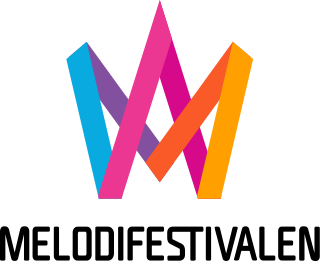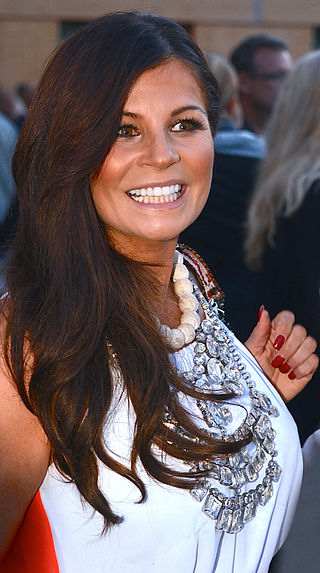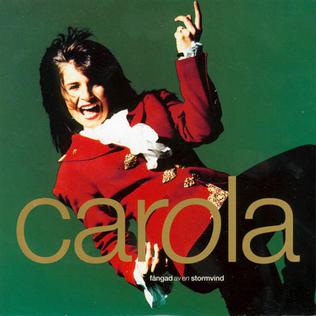
Melodifestivalen is an annual song competition organised by Swedish public broadcasters Sveriges Television (SVT) and Sveriges Radio (SR). It determines the country's representative for the Eurovision Song Contest, and has been staged almost every year since 1959. In the early 2000s, the competition was the most popular television program in Sweden; it is also broadcast on radio and the Internet. In 2012, the heats averaged 3.3 million viewers, and over an estimated four million people in Sweden watched the final, almost half of the Swedish population.

Carola Maria Häggkvist, commonly known simply as Carola, is a Swedish pop singer. She has been among Sweden's most popular performers since the early 1980s and has released albums ranging from pop and disco to hymns and folk music. Her debut album, Främling (1983), sold around one million copies and remains the biggest-selling album in Swedish music history. She has also worked as a songwriter. During her career, she has recorded many top-selling albums and singles and is referred to as Sweden's most prominent female singer. Some of her biggest hits are "Främling", "Tommy tycker om mig", "Fångad av en stormvind", "All the Reasons to Live", "I Believe in Love", "Genom allt", and "Evighet". She has released records in various languages: Swedish, Dutch, German, English, Norwegian and Japanese.

Sweden has participated in the Eurovision Song Contest 62 times since making its debut in 1958, missing only three contests since then. Since 1959, the Swedish entry has been chosen through an annual televised competition, known since 1967 as Melodifestivalen. At the 1997 contest, Sweden was one of the first five countries to adopt televoting. Sweden has hosted the contest six times: three times in Stockholm, twice in Malmö and once in Gothenburg (1985); and is set to host for a seventh time in 2024.
Melodifestivalen 2006 was the selection for the 46th song to represent Sweden at the Eurovision Song Contest. It was the 45th time that this system of picking a song had been used. Five heats had taken place to select the ten songs for the final, in Leksand, Karlstad, Karlskrona, Gothenburg and a Second Chance round in Stockholm. The final was broadcast on SVT1 and Sveriges Radio's P4 network. Carola Häggkvist was the clear favourite to win the final, with bookmakers making her the favourite and an Aftonbladet web poll showing her to have a clear margin over the other participants. The rehearsals sold out for the fourth year running; however, Carola was unable to perform in the final rehearsal due to throat problems. This led to speculation that the final would be closer than expected. Aftonbladet claimed in April 2006 that the televote may have been tampered with, as various sources reported unexplained voting on their telephone bills. It is clear that this would not have affected the result. Various finalists and heatists entered the Swedish Hitlistan chart after the competition. The second placed song, "Temple of Love", finished fourth in the Eurovision Madrid National Finals Song Contest.

"Fångad av en stormvind" is a song by Swedish singer-songwriter Carola Häggkvist. It was written and produced by Stephan Berg. The song is the best known as Sweden's winning entry at the Eurovision Song Contest 1991 held in Rome, Italy, with 146 points.
Melodifestivalen is an event organised by Swedish public broadcasters Sveriges Television (SVT) and Sveriges Radio (SR) to determine the country's representative at the Eurovision Song Contest. The voting procedures to select the entrant for the annual contest have varied over the years since the country's debut in 1958. The Swedish broadcasters have experimented with techniques including splitting the juries by age, regional voting, and using an "expert" jury. Televoting was controversially first introduced in 1993, as an unannounced experiment. The Swedish telephone network promptly collapsed under the strain of phone calls being made.
Melodifestivalen is an annual song competition organised by Swedish public broadcasters Sveriges Television (SVT) and Sveriges Radio (SR). It determines the country's representative for the Eurovision Song Contest, and has been staged almost every year since 1959.
Sweden used a national preselction called Melodifestivalen 1983 to select an entry for the 28th edition of the Eurovision Song Contest. Winner, being the first participant ever to get maximum points from all of the eleven juries, was the 17-year-old and then unknown Carola Häggkvist, who quickly went on to be one of Sweden's most popular singers. The song she competed with was called "Främling". It was written by Lasse Holm and Monica Forsberg, who had also written the previous winning song together.
Sweden entered the Eurovision Song Contest 1990, held in Zagreb, Yugoslavia.
After Carola Häggkvist's win in the 1991 contest, Sweden was the host of the Eurovision Song Contest 1992, held in Malmö. Sveriges Television, the Swedish broadcaster, continued to use the Melodifestivalen format to select their entry.
Sweden was the host of the Eurovision Song Contest 2000 thanks to Charlotte Nilsson's victory the previous year. Sveriges Television chose to hold the contest in Sweden's capital, Stockholm. They were represented by Roger Pontare with the song "When Spirits Are Calling My Name".
Sweden participated in the Eurovision Song Contest 2010 with the song "This Is My Life" written by Bobby Ljunggren and Kristian Lagerström. The song was performed by Anna Bergendahl. The Swedish broadcaster Sveriges Television (SVT) organised the national final Melodifestivalen 2010 in order to select the Swedish entry for the 2010 contest in Oslo, Norway. After a six-week-long competition consisting of four heats, a Second Chance round and a final, "This Is My Life" performed by Anna Bergendahl emerged as the winner after achieving the highest score following the combination of votes from six international jury groups, five regional jury groups and a public vote.
Sweden participated in the Eurovision Song Contest 2011 with the song "Popular" written by Fredrik Kempe. The song was performed by Eric Saade. The Swedish broadcaster Sveriges Television (SVT) organised the national final Melodifestivalen 2011 in order to select the Swedish entry for the 2011 contest in Düsseldorf, Germany. After a six-week-long competition consisting of four heats, a Second Chance round and a final, "Popular" performed by Eric Saade emerged as the winner after achieving the highest score following the combination of votes from eleven international jury groups and a public vote.
Sweden participated in and won the Eurovision Song Contest 2012 with the song "Euphoria" written by Thomas G:son and Peter Boström. The song was performed by Loreen. The Swedish broadcaster Sveriges Television (SVT) organised the national final Melodifestivalen 2012 in order to select the Swedish entry for the 2012 contest in Baku, Azerbaijan. After a six-week-long competition consisting of four heats, a Second Chance round and a final, "Euphoria" performed by Loreen emerged as the winner after achieving the highest score following the combination of votes from eleven international jury groups and a public vote.
Sweden participated in the Eurovision Song Contest 2013 with the song "You" written by Robin Stjernberg, Linnea Deb, Joy Deb and Joakim Harestad Haukaas. The song was performed by Robin Stjernberg. In addition to participating in the contest, the Swedish broadcaster Sveriges Television (SVT) also hosted the Eurovision Song Contest after winning the competition in 2012 with the song "Euphoria" performed by Loreen. SVT organised the national final Melodifestivalen 2013 in order to select the Swedish entry for the 2013 contest in Malmö. After a six-week-long competition consisting of four heats, a Second Chance round and a final, "You" performed by Robin Stjernberg emerged as the winner after achieving the highest score following the combination of votes from eleven international jury groups and a public vote.
Sweden participated in the Eurovision Song Contest 2014 with the song "Undo" written by Fredrik Kempe, David Kreuger and Hamed "K-One" Pirouzpanah. The song was performed by Sanna Nielsen. The Swedish broadcaster Sveriges Television (SVT) organised the national final Melodifestivalen 2014 in order to select the Swedish entry for the 2014 contest in Copenhagen, Denmark. After a six-week-long competition consisting of four heats, a Second Chance round and a final, "Undo" performed by Sanna Nielsen emerged as the winner after achieving the highest score following the combination of votes from eleven international jury groups and a public vote.
Sweden participated in the Eurovision Song Contest 2016 with the song "If I Were Sorry" written by Oscar Fogelström, Michael Saxell, Fredrik Andersson and Frans Jeppsson Wall. The song was performed by Frans. In addition to participating in the contest, the Swedish broadcaster Sveriges Television (SVT) also hosted the Eurovision Song Contest after winning the competition in 2015 with the song "Heroes" performed by Måns Zelmerlöw. SVT organised the national final Melodifestivalen 2016 in order to select the Swedish entry for the 2016 contest in Stockholm. After a six-week-long competition consisting of four heats, a Second Chance round and a final, "If I Were Sorry" performed by Frans emerged as the winner after achieving the highest score following the combination of votes from eleven international jury groups and a public vote.
Sweden participated in the Eurovision Song Contest 2017 with the song "I Can't Go On" written by David Kreuger, Hamed "K-One" Pirouzpanah and Robin Stjernberg. The song was performed by Robin Bengtsson. The Swedish broadcaster Sveriges Television (SVT) organised the national final Melodifestivalen 2017 in order to select the Swedish entry for the 2017 contest in Kyiv, Ukraine. After a six-week-long competition consisting of four heats, a Second Chance round and a final, "I Can't Go On" performed by Robin Bengtsson emerged as the winner after achieving the highest score following the combination of votes from eleven international jury groups and a public vote.
Sweden participated in the Eurovision Song Contest 2018. The Swedish broadcaster Sveriges Television (SVT) organised the national final Melodifestivalen 2018 in order to select the Swedish entry for the 2018 contest in Lisbon, Portugal. After a six-week-long competition consisting of four heats, a Second Chance round and a final, "Dance You Off" performed by Benjamin Ingrosso emerged as the winner after achieving the highest score following the combination of votes from eleven international jury groups and a public vote.
Sweden participated in the Eurovision Song Contest 2019. The Swedish broadcaster Sveriges Television (SVT) organised the national final Melodifestivalen 2019 in order to select the Swedish entry for the 2019 contest in Tel Aviv, Israel. After a six-week-long competition consisting of four heats, a Second Chance round and a final, "Too Late for Love" performed by John Lundvik emerged as the winner after achieving the highest score following the combination of votes from eight international juries and a public vote.



